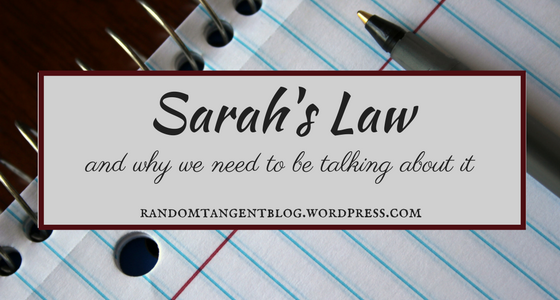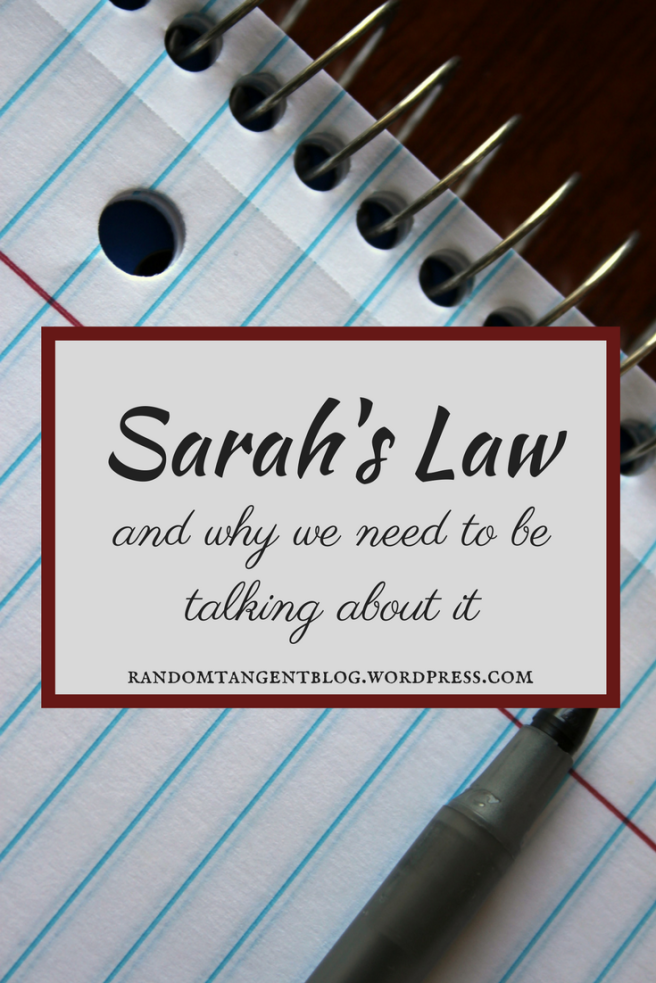A few weeks ago, I wrote a post about Clare’s Law Domestic Abuse and Disclosure Scheme, and became increasingly aware that very few people knew of this potentially lifesaving scheme.
If you are reading this post still unaware of Clare’s Law and how it can potentially help to protect yourself or your loved ones, read about it here.
In light of the general lack of knowledge around Clare’s Law, I felt it necessary to also write a post about Sarah’s Law and the importance of this scheme.
Why Sarah’s Law?
Many people will remember the story of Sarah Evelyn Isobel Payne, the 8 year old school girl who was abducted, assaulted and murdered in England, in July 2000. The child was kidnapped whilst playing with her siblings near to her grandparents’ house by Roy Whiting, a man who had previously been jailed for abducting and indecently assaulting a minor of the same age. In 1995 Whiting was convicted for his previous attacks and imprisoned for four years, yet, upon his release, was able to re-offend, with Sarah falling victim to his malevolent crimes.
Sarah’s Law Explained
Sarah’s Law, also known as the Child Sex Offender Disclosure Scheme, was established in England and Wales in 2011, as Sarah Payne’s parents called upon the government to take action to avoid a tragedy like their daughter’s happening again.
The scheme follows from similar legislation that was introduced in America in 1996, named Megan’s Law. Megan’s Law was established after the rape and murder of 7 year old Megan Kanka, by Jesse Timmendequas, a man with two previous convictions of sexual assaults towards children aged 5 and 7.
For England and Wales, the Child Sex Offender Disclosure Scheme (Sarah’s Law) allows any parent, guardian or third party to formally contact the police and enquire about the previous convictions of any individual who has contact with a child. If the individual with contact is found to have a record of previous child sexual offences, or offences that may make the individual a risk to the child, the police will consider sharing this information. The information about previous convictions is typically shared with the child’s parent or guardian, where necessary steps can be taken to protect the child.
An individual’s previous convictions are confidential, therefore the police will only disclose information if they deem it is necessary to do so for the best interests of the child.
Contact
If you have concerns about an individual’s contact with a child and wish to address this via Sarah’s Law Child Sex Offender Disclosure Scheme, you can do so in the following ways:
- Dial 101 (the police non-emergency telephone number) to discuss your concerns.
- Visit your local police station and ask to fill out a Child Sex Offenders Disclosure Form.
- If you feel the situation is an emergency, do not hesitate to call the police emergency telephone number on 999.
Other Useful Contacts
NSPCC
The UK’s leading children’s charity, to prevent abuse and help those affected.
Phone: 0808 800 5000 Email: help@nspcc.org.uk
Parents Protect
To help parents and carers better protect children from abuse.
Phone: 0808 1000 900 Email: help@stopitnow.org.uk
Childline
A free 24 hour counselling service for children and young people.
Phone: 0800 1111 Email via website here.



Wow I didn’t even know about this, it’s very useful but sad that we need to call upon this law in this day and age 😔 RIP little ones…
LikeLiked by 1 person
Extremely saddening, but important to share. These potentially lifesaving schemes are not spoken about enough.
Cori x
LikeLiked by 1 person
Really useful stuff!
Thanks for sharing this 🙂
Kelly
http://www.thiswayandthatway.com
LikeLiked by 1 person
I don’t have children and neither did I know about this, but thanks for bringing such important info to light! Need all the help we can get with this stuff xx
J | http://thenellybean.com
LikeLiked by 1 person
Can
LikeLike
Can’t believe I’ve never heard of this before, definitely important to be sharing so thank you!!
LikeLiked by 1 person
This is so important as well as heartbreaking. Thanks for sharing x
LikeLiked by 1 person
I found this post to be very interesting & I am glad you made it as I didn’t know about Sarah’s law. Xx
LikeLiked by 1 person
I’m glad it’s helping to get this important information out there. Xx
LikeLike
Wow i didnt even know about this! Thanks so much for sharing!
I would love your thoughts on my latest blog post:
http://thisissivylla.com/2017/11/era-nuts-herbs-spices/
Love,
Sivylla
LikeLiked by 1 person
Thanks!
I’ll be sure to check your post out this evening. 🙂
LikeLike
It disgusts me that we need these laws. What is wrong with people?? I also don’t understand why (in the US at least) you can get life for some stupid weed offense, but get out in 3 years after sexually assaulting someone. Our priorities are definitely out of whack.
LikeLiked by 1 person
I’ve actually heard about this before but never realised how it originated. What an awful story, it’s great that you’re making people more aware of laws like this.
LoneTeenTraveller | Travel Fashion Lifestyle
LikeLiked by 1 person
Thank you for taking the time to read and comment.
These important laws need to be spoken about more. x
LikeLike